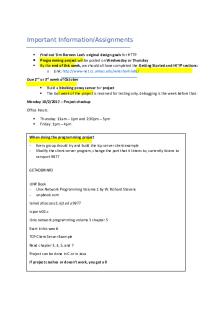BOS Notes 2 PDF

| Title | BOS Notes 2 |
|---|---|
| Author | Gallant Shang |
| Course | Introduction to Organizational Behaviour |
| Institution | McMaster University |
| Pages | 4 |
| File Size | 90.3 KB |
| File Type | |
| Total Downloads | 49 |
| Total Views | 139 |
Summary
chapter 2 notes...
Description
BOS Notes 2 September 4 2019 SAS. Mcmaster.ca (for volunteering) -
-
Organizations are social invention (how)for accomplishing common goals (what, why) through group efforts (how) ** EXAM ** The most important question is why do we want to these tasks Organization: values, how organizations can adapt to change o How to get people to work together Thermostat analogy: where you are and where you want to go
Formula is s + t =r where situation plus thinking = reaction ( outcome) Micro: Organization: Individuals work in pursuit of goals Mezo: Organizational Interacting teams, groups and departments o Cluster Macro: Organizations are open systems ( exterior factors uncontrollable) OB definition: the attitude and behaviour of individuals and groups in organizations o Goal: Attempt to understand, predict, explain and manage how people behave at work.
Notes part 3: September 6 2019 -
-
HR- Management o Bundle One 1 The evolution of OB Classical Traditional Views Early 1900’s Max Welber Bureaucracy Strict Chain of command o Scientific Management o Fredrick Taylor Research to create specializations Work design Improve employee behavior Both Fredrick and Max are non humanistic
The evolution of OB ( cont’d) 2 -
Hawthorne Studies: research conducted at the Hawthorne plant of how social processes affect productivity Advocated management styles that are more participated and orientated towards employee Needs ( Elton Mayo )
-
-
Abraham Maslow: Maslow’s Hierarchy of needs o Basic Needs of Physiological needs o Safety and security o Affiliation o Esteem o Self actualization Workplace productivity McGregor’s theory x and theory Y
Theory Y: -
The concept of theory x was people who dislike work, have little ambition, and are unwilling to take responsibility (authoritarian) The concept of theory is when people are willing to contribute to the betterment of the collective and not themselves. ( participative)
The evolution of OB ( cont’d) 3 -
Beyond human relations Participative management Workplace democracy Fostering autonomy Employees contributing to productivity
Where are we today? 4 -
-
The contingency/ systems approach o No one best way to manage o Management style depends on the demands of the situation Ambiguity where the future is constantly uncertain filled with disruptions
September 6 2019 What do managers do? Managerial roles according to mintzberg Information roles -
Monitoring Disseminator Spokesperson
Interpersonal Roles
-
Figurehead is a symbol of the organization Leader Liaison
Decision Roles -
Entrepreneurship Disturbance handler Resource allocator Negotiator ( page 14)
What do managers do? -
Managerial Activities according to Luthans Routine communication Traditional Management Networking Human Resource Management
How managers think: Simon & Isenberg -
Situational sensing Rapid mental processing/ analyses Synthesizing: a combination of dependent things into a coherent group Analysis Intuition is
Managerial Agendas according to Kotter -
Agenda setting Networking Agenda implementation
Trends Managers are facing today ( common consulting) -
Diversity management Employee health & well being ( positive ob, workplace spirituality) Talent management & employee engagement o Using the right skills and recruiting the right people Focus on corporate social responsibility
Then vs Now Job Security - Lifetime job security - Jobs are permanent - Company manages career
Employability - Limited job security - Jobs are temporary - Career self- management
-
Low emphasis on skill development
-
High emphasis on skill development...
Similar Free PDFs

BOS Notes 2
- 4 Pages

Summary BOS
- 1 Pages

BOS Patanjali - Report
- 6 Pages

Formulir bos 10 sk guru
- 3 Pages

Patanjali BOS Report Group 3 Condor
- 37 Pages

E-BAKERY ORDERING SYSTEM (E-BOS
- 25 Pages

MNB1501-Notes-2 - NOTES
- 24 Pages

2 - Lecture notes 2
- 5 Pages

Notes 2
- 6 Pages

Notes 2
- 17 Pages

2 - notes
- 11 Pages

Notes 2
- 3 Pages
Popular Institutions
- Tinajero National High School - Annex
- Politeknik Caltex Riau
- Yokohama City University
- SGT University
- University of Al-Qadisiyah
- Divine Word College of Vigan
- Techniek College Rotterdam
- Universidade de Santiago
- Universiti Teknologi MARA Cawangan Johor Kampus Pasir Gudang
- Poltekkes Kemenkes Yogyakarta
- Baguio City National High School
- Colegio san marcos
- preparatoria uno
- Centro de Bachillerato Tecnológico Industrial y de Servicios No. 107
- Dalian Maritime University
- Quang Trung Secondary School
- Colegio Tecnológico en Informática
- Corporación Regional de Educación Superior
- Grupo CEDVA
- Dar Al Uloom University
- Centro de Estudios Preuniversitarios de la Universidad Nacional de Ingeniería
- 上智大学
- Aakash International School, Nuna Majara
- San Felipe Neri Catholic School
- Kang Chiao International School - New Taipei City
- Misamis Occidental National High School
- Institución Educativa Escuela Normal Juan Ladrilleros
- Kolehiyo ng Pantukan
- Batanes State College
- Instituto Continental
- Sekolah Menengah Kejuruan Kesehatan Kaltara (Tarakan)
- Colegio de La Inmaculada Concepcion - Cebu



